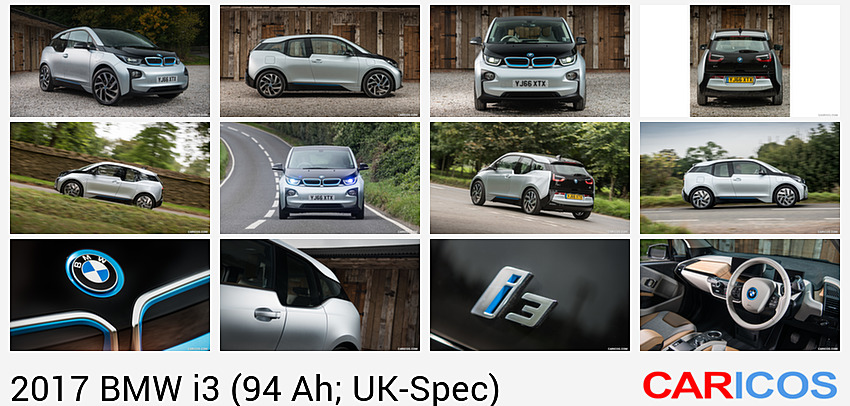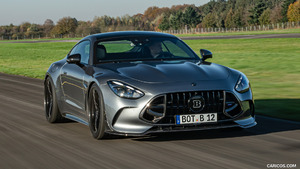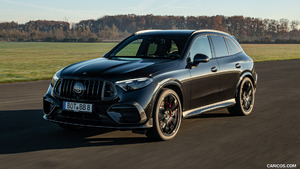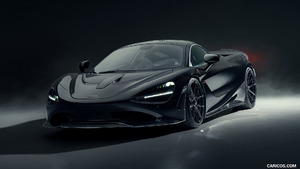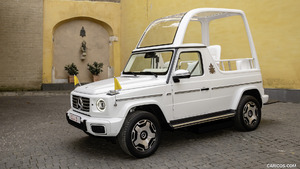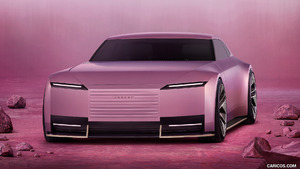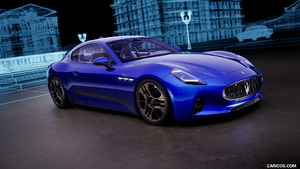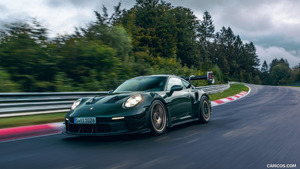BMW i3 (94 Ah; UK-Spec)
The BMW i3 is the world’s first premium car designed from the ground up to be powered by an electric drive system. The result is a vehicle that embodies BMW’s commitment to driving pleasure without compromise. Since the launch in November 2013 the BMW i3 has gone from strength to strength winning various accolades including UK Car of the year 2014 and Green Car of the Year by WhatCar? Now, the success story is set to continue with the introduction of the 94Ah battery on both the BMW i3 and the BMW i3 Range Extender models.
The BMW i3 94Ah replaces the current 60Ah model and has a capacity of 33kWh thanks to the higher storage density of the lithium ion cells. The battery dimensions remain unchanged with more than a 50 per cent range increase in the standard NEDC cycle, this equals a range of 195 miles. The motor propels the BMW i3 from zero to 62mph in just 7.3 seconds (BEV) making the BMW i3 both the sportiest and most efficient electric vehicle in its segment.
The latest in innovative battery technology.
The high-voltage battery in the BMW i3 consists of eight modules (each with 12 individual cells), and its capacity has increased significantly without any changes in structure or exterior dimensions. By optimising the cell-internal packages with more electrolyte and adapting the active material, BMW has succeeded in increasing cell capacity to 94Ah and overall battery energy to 33kWh.
The lithium-ion cells used in the battery are particularly notable for their high energy density and impressive cycle life: they are designed to perform their energy storage function over the vehicle’s entire lifespan.
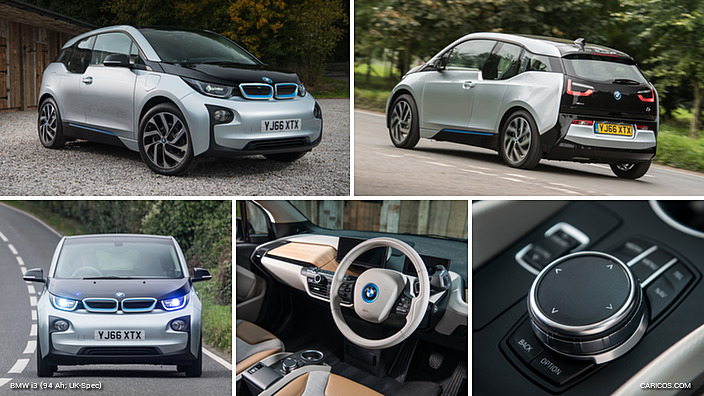 2017 BMW i3 (94 Ah; UK-Spec)
2017 BMW i3 (94 Ah; UK-Spec)
The coolant of the air conditioning system is responsible for cooling the high-voltage battery very effectively. An optional heating system can also be used to heat the battery to ensure the optimum operating temperature of 20°C before starting off. The battery has been designed to last for the car’s entire service life. Customers receive an 8-year or 100,000 mile warranty on the battery.
The electric drivetrain: Optimised performance delivery, more efficient drive.
The hybrid synchronous electric motor, developed and produced specially for use in the BMW i3, generates an output of 170hp and provides maximum torque of 250Nm from the moment the car pulls away.
| Model | Price OTR | Power Hp | Torque Nm | 0 – 62mph Seconds | Top Speed Mph | Range (miles) | CO2 Emissions g/km |
| BMW i3 | £27,830** | 170 | 250 | 7.3 | 93 | 195 | 0 |
| BMW i3 Range Extender | £30,980** | 170 | 250 | 8.1 | 93 | 276 | 12 |
**With £4,500 OLEV Government grant.
Thanks to an average power consumption of 12.6kWh/100km (in the New European Driving Cycle (NEDC) for the BMW i3 and 11.3kWh/100km for the BMW i3 Range Extender, the efficiency of the motor plays a key role in optimising the car’s range to 195 miles. The BMW i3 is thus the most economical electrically powered car of its size and output class. With significant benefits available from low charging tariffs, the low cost per mile would equate to running a diesel engine and achieving 470.8mpg.
The emissions of the BMW i3 94Ah with Range Extender amounts to 12g/km, a 1g/km reduction in comparison to the previous model while the exclusively electrically powered BMW i3 produces zero emissions locally.
The power density of the electric motor, weighing around 50kg, sets a new benchmark for electric vehicles. But the new engine is about more than simply numbers: with its smooth running, minimal vibration and low noise levels, it offers a uniquely calm driving experience.
When it comes to the driving attributes of the i3, BMW engineers have achieved a perfect balance of vehicle weight, performance and range. In addition to this, the new model also benefits from improved efficiency and DC Rapid-charge as standard. AC charging is now multi-phase allowing charging of 3.7, 7.4 or 11 kW, this represents a 50 percent increase compared to the previous BMW i3 60Ah. This means the charging time for the BMW i3 (94Ah) is less than three hours, in spite of the significantly larger battery capacity. The new BMW i3 94Ah can also be charged at home using a standard three-pin plug or by specifying a BMW i Wallbox.
Range Extender for even greater range.
The Range Extender delivers a maximum output of 38hp and powers a generator in order to produce electricity. It operates on a needs-based and highly efficient principle. As soon as the charging level of the lithium ion batteries drops to a certain level, the Range Extender kicks in to keep the charging level constant thus extending the range by 81 miles. Fitting the car with the Range Extender has no influence on the available luggage volume: the nine-litre fuel tank is installed in the front section. The luggage compartment volume remains unchanged at 260 litres and can be extended to 1,100 litres with the rear seats folded down.
New options, greater personalisation.
The BMW i3 94Ah will be instantly recognisable in the colour Protonic Blue with its Frozen Grey metallic highlight, which is available exclusively for this model. Previously, this paintwork was reserved for the BMW i8 hybrid sports car, but is now also available for the BMW i3.
Allowing for greater personalisation for owners, the Interior trims are now available as separate options and are available across all four Interior worlds, this includes Loft, Lodge, Suite and new Atelier interior world which comes as standard on the new BMW i3 94Ah model. The Atelier Interior world features Neutronic cloth in Aragats Grey with BMW i Blue highlights on the front seats and black leather steering wheel.
The new elegant dark oak trim is a standard equipment in the Suite interior design. In all other interior designs the Dark Oak wood trim and the eucalyptus wood trim are available as options. The materials used are a mix of naturally treated leather, wood and wool as well as other renewable raw materials. These make the sustainable premium character of the BMW i3 both visible and tangible.
Production and sustainability beyond the life of the car
The manufacturing procedure and lifespan of the BMW i3 has been carefully considered, with sustainability at the forefront of thinking. Regenerative energy is used at all four BMW i plants across the globe, with 50 per cent less water consumed and 70 per cent less energy than in a conventional automotive facility.
The carbon fibre required is produced at the BMW SGL Moses Lake plant in Washington State, which is completely powered by hydro-generated electricity. Construction of the CFRP architecture at Landshut, general assembly at Leipzig and recycling at Wackersdorf (all in Germany) are all powered by 100 per cent wind turbine energy.

